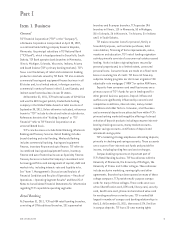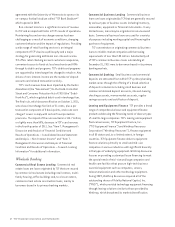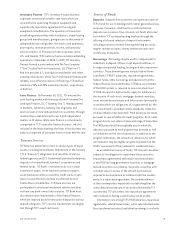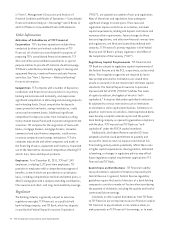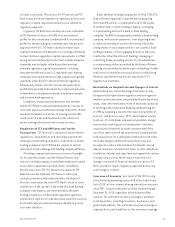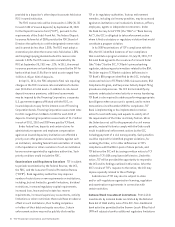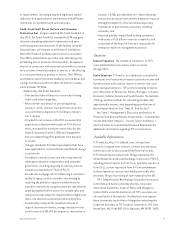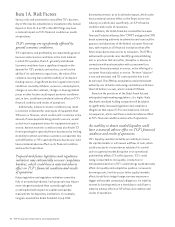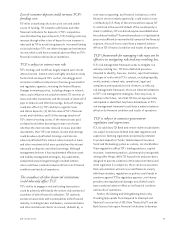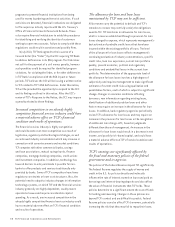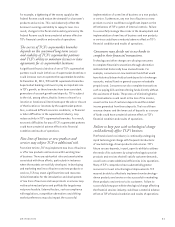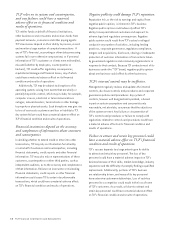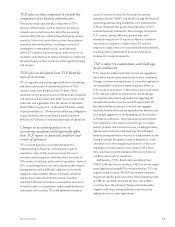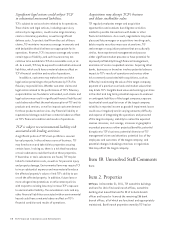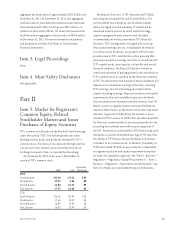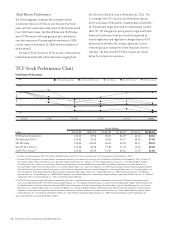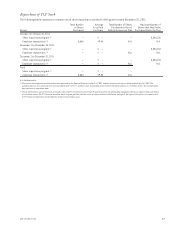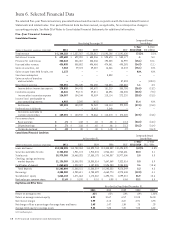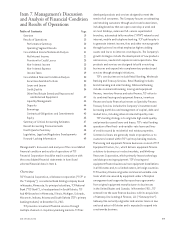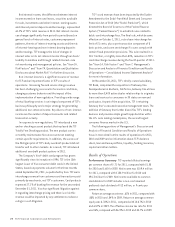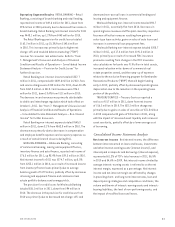TCF Bank 2011 Annual Report Download - page 29
Download and view the complete annual report
Please find page 29 of the 2011 TCF Bank annual report below. You can navigate through the pages in the report by either clicking on the pages listed below, or by using the keyword search tool below to find specific information within the annual report.For example, a tightening of the money supply by the
Federal Reserve could reduce the demand for a borrower’s
products and services. This could adversely affect the
borrower’s earnings and ability to repay its loan. As a
result, changes to the fiscal and monetary policies by the
Federal Reserve could have a material adverse effect on
TCF’s financial condition and results of operations.
The success of TCF’s supermarket branches
depends on the continued long-term success
and viability of TCF’s supermarket partners
and TCF’s ability to maintain licenses or lease
agreements for its supermarket locations.
A significant financial decline of one of TCF’s supermarket
partners could result in the loss of supermarket branches or
could increase costs to operate the supermarket branches.
At December 31, 2011, TCF had 231 supermarket branches.
Supermarket banking continues to play an important role
in TCF’s growth, as these branches have been consistent
generators of account growth and deposits. TCF is subject
to the risk, among others, that its license or lease for a
location or locations will terminate upon the sale or closure
of that location or locations by the supermarket partner.
Also, continued difficult economic conditions, or financial
or labor difficulties in the supermarket industry, may
reduce activity in TCF’s supermarket branches. As a result,
economic difficulties for any of TCF’s supermarket partners
could have a material adverse effect on its financial
condition and results of operations.
New lines of business or new products and
services may subject TCF to additional risk.
From time to time, TCF may implement new lines of business
or offer new products and services within existing lines
of business. There are substantial risks and uncertainties
associated with these efforts, particularly in instances
where the markets are not fully developed. In developing
and marketing new lines of business and new products or
services, TCF may invest significant time and resources.
Initial timetables for the introduction and development
of new lines of business and new products or services may
not be achieved and price and profitability targets may
not prove feasible. External factors, such as compliance
with regulations, competitive alternatives and shifting
market preferences may also impact the successful
implementation of a new line of business or a new product
or service. Furthermore, any new line of business or new
product or service could have a significant impact on the
effectiveness of TCF’s system of internal controls. Failure
to successfully manage these risks in the development and
implementation of new lines of business and new products
or services could have a material adverse effect on TCF’s
financial condition and results of operations.
Consumers may decide not to use banks to
complete their financial transactions.
Technology and other changes are allowing consumers
to complete financial transactions through alternative
methods that historically have involved banks. For
example, consumers can now maintain funds that would
have historically been held as bank deposits in brokerage
accounts, mutual funds or general-purpose reloadable
prepaid cards. Consumers can also complete transactions
such as paying bills and transferring funds directly without
the assistance of banks. The process of eliminating banks
as intermediaries could result in the loss of fee income,
as well as the loss of customer deposits and the related
income generated from those deposits. The loss of these
revenue streams and the lower cost of deposits as a source
of funds could have a material adverse effect on TCF’s
financial condition and results of operations.
Failure to keep pace with technological change
could adversely affect TCF’s business.
The financial services industry is continually undergoing
rapid technological change with frequent introductions
of new technology-driven products and services. TCF’s
future success depends, in part, upon its ability to address
the needs of its customers by using technology to provide
products and services that will satisfy customer demands,
as well as to create additional efficiencies in its operations.
Many of TCF’s competitors have substantially greater
resources to invest in technological improvements. TCF
may not be able to effectively implement new technology-
driven products and services or be successful in marketing
these products and services to its customers. Failure to
successfully keep pace with technological change affecting
the financial services industry could have a material adverse
effect on TCF’s financial condition and results of operations.
112011 Form 10-K


